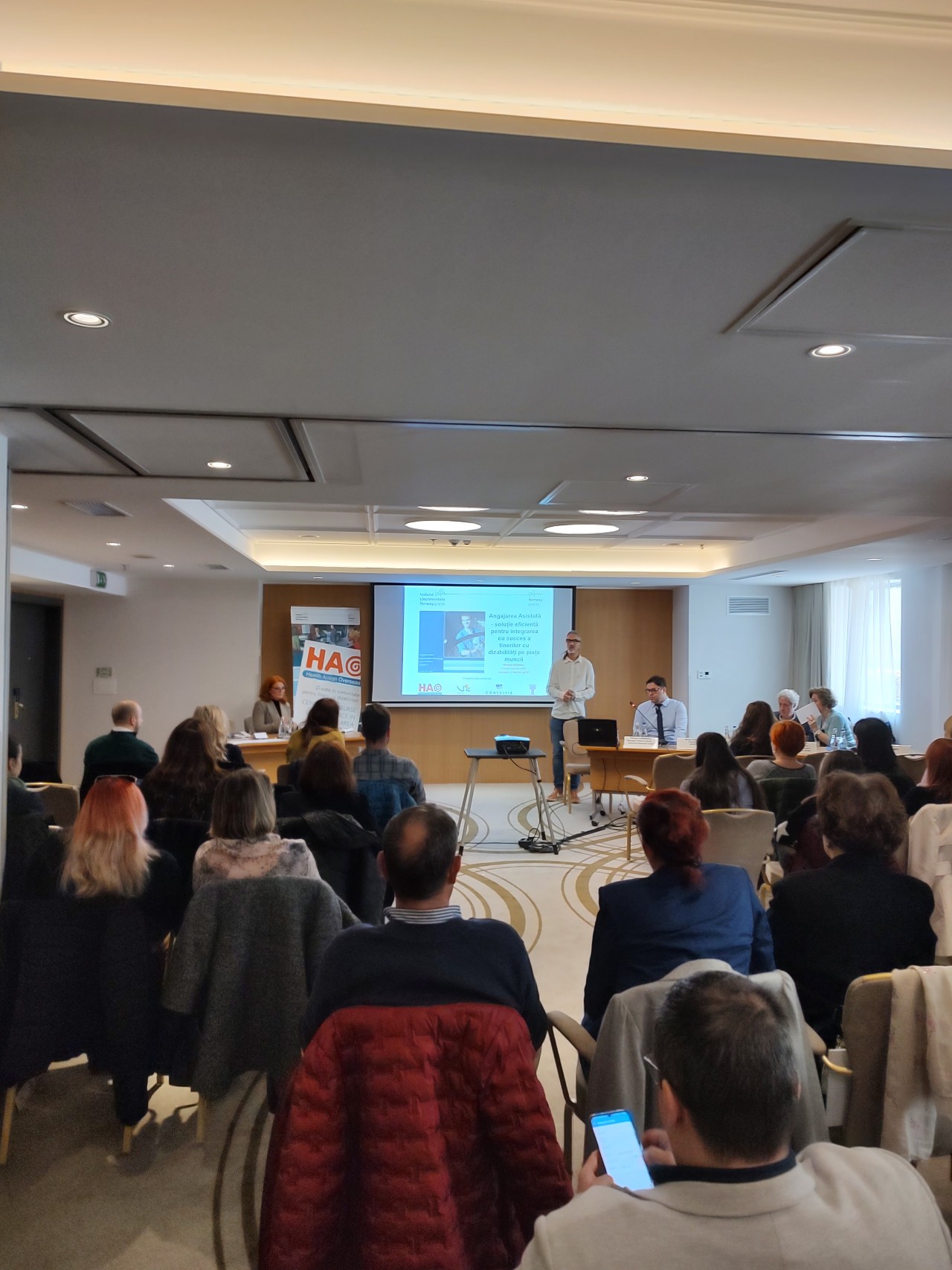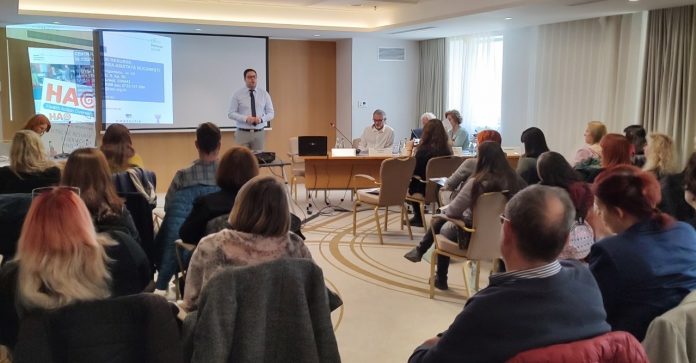This was the main conclusion of the National Forum “Supported Employment – challenges, solutions, perspectives”, organised on the 18thof November by Health Action Overseas Romania (HAO). The attendence list of the event included: representatives of public institutions engaged in disability policies, public and private providers of educational, social and employment services, human resources specialists from organisations and companies interested in assuring an inclusive work environment, young adults with disabilities, journalists.
The Supported Employment – viable solution for the integration of people with disabilities on the labour market
“We organised this Forum to discuss constructively about the wide spread of the Supported Employment model, as a solution for the integration of people with disabilities on the labour market. Why? Because Romania has an huge need for support services for these people. Let’s not forget that there are about 850,000 people with disabilities in our country and less than 8% of adults with disability work. Why do we promote Supported Employment? Because it is a win-win model, based on a partnership strategy between the employee, the employer and the employment service provider, which it has successfully passed the test of time, both internationally and in Romania. It is time to offer as many people with disabilities as possible the chance to have access to this service”, said Nicolae Dobrescu, Executive Director of HAO and Manager of the Labour market Employment for young Adults with a Disability project (LEAD).
Public-private task force for the issue of Supported Employment
During the event, Mihai Tomescu, the president of the National Authority for the Protection of the Rights of Persons with Disabilities (ANPDPD), provided very good news to the participants. He talked about the Authority’s concrete steps on the issue of Supported Employment, structured on three pillars: regulation, financing and organisational culture. In this context, Mihai Tomescu launched a public invitation to experienced non-governmental organisations to work together, within a public-private task force, with the aim of writing methodology for organising Supported Employment in our country. Regarding funding, the president of ANPDPD announced the negotiation of a program with European fundingin the amount of 13 million euros.
Regard to the organisational culture, Mihai Tomescu emphasized the role of non-governmental organisations in changing the way the disabled person is perceived on the labour market. “You really change the inclusion practices, through your efforts, through the events organised by you! We need your support, experience and involvement. Let’s write together the methodology for organising Supported Employment in Romania! Let’s establish the legal framework, let’s finance Supported Employment and let’s put it to work!” said the president of ANPDPD.
Also, Răzvan Munteanu, representative of the National Agency for Employment, coordinator of the project “Facilitating the insertion on the labour market of people with disabilities”, highlighted that the change of mentality regarding disability, and the collaboration of all the factors involved, both from the public and private sector are needed.
Supported Employment on the EUSE model, successfully implemented in Romania within the LEAD project
The presentation of Robert Elston, vice-president of the European Union of Supported Employment (EUSE) and Chief Executive, Status Employment(expert partner within LEAD project) was particularly well-received by the audience. Robert, which has 40 years of experience in Supported Employment, pointed out some theoretical and practical aspects regarding the successful application of this model. In the context, he talked about the principles and stages of Supported Employment. Also, he provided valuable information about ways of working with both person with disability and employer in order to achieve a successful, long-term integration of the beneficiary. At the same time, Robert Elston gave details about: his involvement in the EUSE activity, collaboration with HAO team within LEAD project, and about the support offered to our colleagues from Lithuania and Portugal, on the issue of Supported Employment.
Regarding Romania, Alina Dobrescu, Coordinator of the Supported Employment Programme, pointed out: “Since 2018, we have provided Supported Employment services, based on the EUSE model, within the LEAD project. In these years, we have achieved very good results both quantitative (practically all assumed indicators have been exceeded by almost 100%) and qualitatively, aspect on which we particularly focused our attention. I am happy to say that our young beneficiaries have managed to get suitable jobs and keep them for the long term, to evolve, and to become respected members of the community, with adequate support, provided by our team ”
Success stories – in Bucharest and in the country
A special section was dedicated to the success stories. For example, the participants had the opportunity to meet Diana, full-time employee with Pizzeria San Marco in Constanța, and to find out from Elisabeta Novac, the representative of the mentioned company, how the Supported Employment process is perceived by an employer who has collaborated with our team since 2018. “Ștefan was the first young man hired thanks to the HAO team. He still works with us. He was promoted and he is a valuable member of our team”, said Elisabeta Novac.
 On this occasion, we invited colleagues from other non-governmental organisations working with and for people with disabilities to present their good practices. Thus, Gabi Comănescu, director, “Motivation” Romania Foundation; Dalina Coșariu, social worker, “For You” Foundation, and Cristina Geană, vocational counselor, “Pro Act Suport” Association, talked about their success projects and programmes run for the benefit of children and adults with different disabilities.
On this occasion, we invited colleagues from other non-governmental organisations working with and for people with disabilities to present their good practices. Thus, Gabi Comănescu, director, “Motivation” Romania Foundation; Dalina Coșariu, social worker, “For You” Foundation, and Cristina Geană, vocational counselor, “Pro Act Suport” Association, talked about their success projects and programmes run for the benefit of children and adults with different disabilities.
The project “Labour market Employment for young Adults with a Disability – LEAD” is funded by Iceland, Liechtenstein and Norway through the EEA and Norway Grants Fund for Youth Employment.
Cristina Șerbănescu


